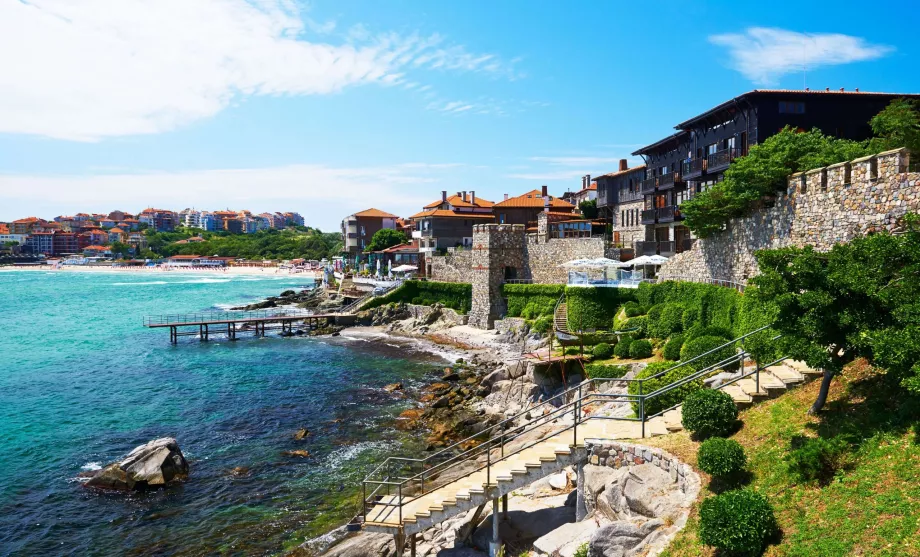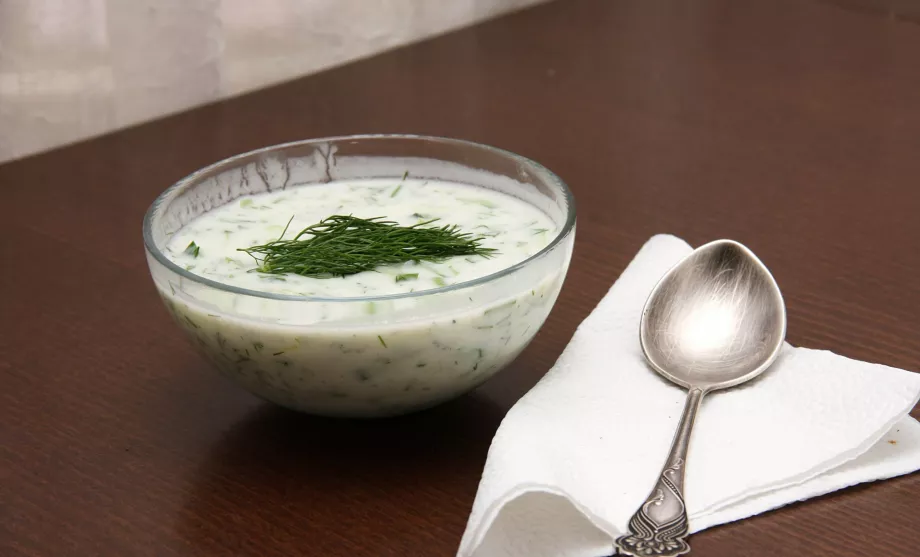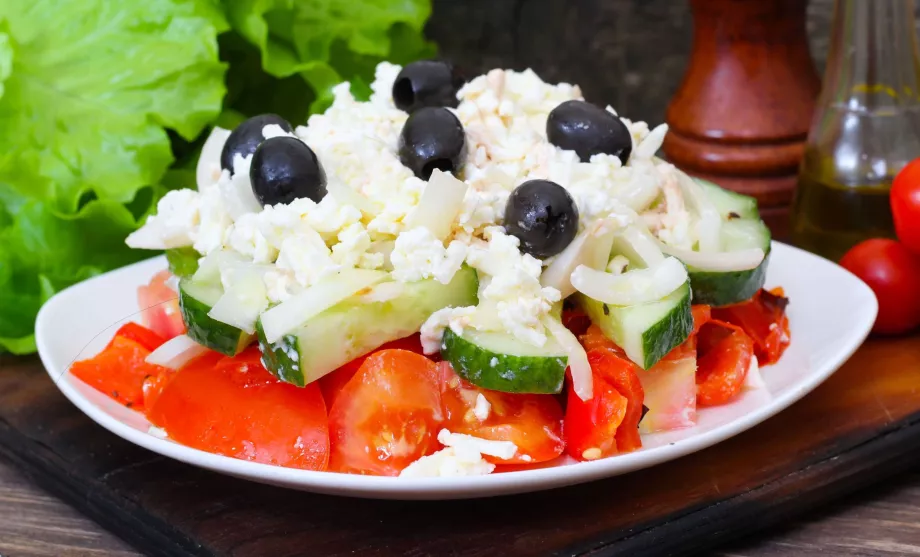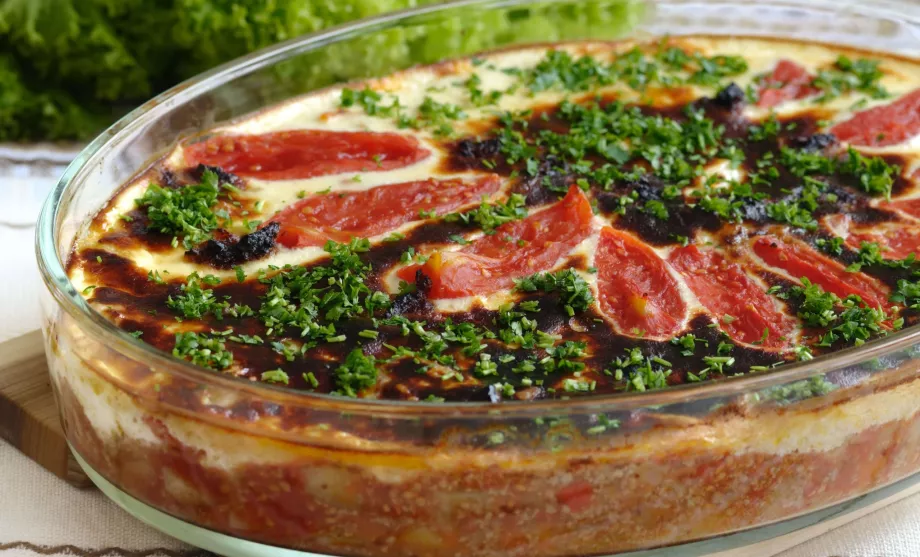Traditional food in Bulgaria

What food should you try in Bulgaria? What is most often sold in local restaurants?
Book accommodation with breakfast
Bulgarian cuisine
The local cuisine is made from locally grown produce with plenty of vegetables and salads. Meals tend to be light. The main meats prepared are chicken and fish.
Bulgarian cuisine is considered one of the healthiest in Europe.
The large proportion of vegetables and dairy products consumed is said to be the reason for their longevity.
Typical Bulgarian specialities
Bulgarians claim to have "discovered" yoghurt in their country, which they call kiselo mljako. This product contains special bacteria that protect the body from toxins and even some cancers. This speciality is then only really available in Bulgaria. Furthermore, there is a great tradition of winemaking here, and the red wines in particular are excellent.
Chopped salad - the base is Balkan cheese. It is called "syrene" and has a slightly sweet to buttery taste. Other ingredients are cucumbers, tomatoes and sweet onions, olives and a little dressing. Simple and tasty. Bulgarians start their main meal with this dish (instead of our soup).
Soups - in Bulgaria, they often represent the main course and some of them belong to the Bulgarian national dishes. Typical soups are:
- Bob čorba: Thick bean soup,
- Tarator: cold soup made of sour milk with dill, cucumbers and nuts,
- Pilšeka supa: chicken soup,
- Ribena supa: fish soup,
- Škembe čorba: tripe soup with peppers and a little milk.
Kefta and kebabs - in Bulgaria, meat is most often eaten minced and grilled.
Kefti is one of the most traditional cheap dishes that you can find in absolutely every stall, fast food and restaurant. These are actually the classic mini meatballs, while kebabpčata (sometimes also kebabče) are meatballs with an oblong shape very similar to chevapčič.
The most common spice used in minced meat is Roman cumin or saturejka. Kebabs are often sold as a quick snack in a bread or bun, and in restaurants overwhelmingly with chips.
Musaka - a traditional Balkan dish. It is a mixture of minced meat and vegetables such as onions, garlic, eggplant and tomatoes. Sometimes with potatoes.
Banitsa - a classic savourycake that you can find in every bakery, is typical for Bulgaria. The cake is made of puff pastry-like dough and its filling is delicious aromatic cheese, cream and white yoghurt.
Fish - as in any coastal country, Bulgarian restaurants boast a wide range of seafood. Among the most popular are sea mackerel, very fine fillets of black sea shark or grilled herring.
A special delicacy is the small caca fish, which tastes very similar to sardines. They are fried in batter and usually eaten after the main meal or just as chips or popcorn.
Kashkaval - is a typical Bulgarian hard cheese made from both cow's and sheep's milk. It originated in the Bulgarian mountains of Rila and Pirin, but its aromatic taste is known all over the world.
Drinks
As for soft drinks, Bulgarians drink mostly mineral water and are very fond of drinking tea with or after meals. Beware, however, if you order tea in a restaurant, they will automatically bring you a local herbal tea. If you want classic black tea, you have to explicitly ask for "black tea".
As for alcoholic beverages, the locals are most fond of beer. Bulgarian beer is quite good and the most famous local brands include Zagorka, Ariana or Burgasko. Beers from the Czech Republic are also very popular in Bulgaria.
Wine is also a very good Bulgarian product. The suitable climate and the hilly nature of the landscape combine to provide ideal conditions for growing grapes. Wine is also very cheap in Bulgaria and you can buy a good quality bottle from about 3 eur.
A specific drink is Boza, which probably originated in Turkey, but is also very popular here. It is a fermented malt drink with a thick consistency and a slightly sour sweet taste. The alcohol content is about 1%.
Of the hard alcohol, the following drinks are typically local:
- Rakije - the origin of this spirit made from grapes, plums and figs is discussed in several Balkan countries and where it really comes from is probably impossible to prove reliably. In any case, it is one of the most popular types of hard liquor in Bulgaria,
- Mastika - an aniseed drink that should contain at least 47% alcohol. It is served chilled.
How to eat like a local
Locals prefer to eat in small stalls or small restaurants with plastic chairs in the gardens 4 eur.
By far the most common Bulgarian fast food dish is "chlabcha i kebabcha". It's a meatball sandwiched in a bun with a slice of onion and cucumber and topped with tomato ketchup. It just tastes like meatloaf with satay.
There are many similar stalls and mini-restaurants in Bulgaria and you can find them in every major village. In the biggest resorts on the Black Sea coast, however, they are slowly giving way to more expensive tourist restaurants, and you will only experience a truly authentic Bulgaria in the metropolises of Varna or Burgas, or in the smallest resorts.
Any questions left?
If you have any questions or comments about the article...




